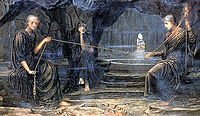
Post-God or human reinvention
A few days ago I read in Folha de São Paulo (in an online note) that the famous mystical physicist Fritjof Capra (Tao of Physics) said that the pandemic is a “Pandemic is the biological response of the planet”, and also in his conference in the Frontieras debate of Thought about the “Reinvention of the human”, in which also spoke the economist Paul Collier and french writter Alain Babanckou.
the famous mystical physicist Fritjof Capra (Tao of Physics) said that the pandemic is a “Pandemic is the biological response of the planet”, and also in his conference in the Frontieras debate of Thought about the “Reinvention of the human”, in which also spoke the economist Paul Collier and french writter Alain Babanckou.
In his lecture, he supposes an awakening in 2050 and visualizing the world and its post-pandemic transformations, already well defined, what he and the futurist Hazel Henderson propose are imaginable perspectives, as which relatives for the past verified as flaws and human conditions which changes they happen to be perceived, I think so, thinking about a distant scenario, I thought a much more valid reflection than thinking about next year.
In the thinking of the Austrian physical-mystic he considers that an expanded consciousness would help to overcome the cognitive limitations (and cultural addition), the mistaken assumptions and ideologies that are called back in the prices of the 20th century, and development and productivist metrics, such as the GDP, ended up allowing huge social and environmental losses and the destruction of the functions of planetary exosystems.
Little is said about the persistence of Religions and the answers they too can give and the role they will play in a post-pandemic stage, although nicht made explicit by the physicist and not even by economists who also come from the inorganic in the thematic conversation of the Swans, of the earth whether by chemical processes, by hands or by divine breath, the truth is that we were created, so a complete nicht eschatology will speak only of the post-human, but of the pre-human.
Where do we come from, from the dust of the planets, now that we can look at thousands across the cosmos like telescopes that are like the reinvention of Galileo’s spyglass that shook the 17th century, we are now looking at an infinitely more enigmatic, like particles of God and as a collapse of matter in black holes, what awaits us is not just a post-God, but the reinvention of a cosmology capable of also giving man his crisis, whose pandemic is just a symptom.
Peter Sloterdij wrote in his “Post-God”, that Greek mythology: “had predicted the revenge of time against eternity from afar, when the allusion that even the immortal gods would have to learn to live with a destiny of higher order ”(Sloterijk, 2019, p. 12) and the Greeks called this Moira, but this destiny also foresees the eschatological Matris in Gremio, described by Sloterdijk himself in“ Spheres I: bubbles ”(see our post).
Taking advantage of the allusion to the rebellious nature of Fritjof Capra, and if it has not yet taken place completely, the post-pandemic can predict an aortic rebellion from outside the planet, and if Moira still wants to have one last word, which was three and not just a Cloto, Láquesis and the Atropos, that wove the threads of the destiny (figure).
While Cloto means to spin, Láquesis means to draw, remember the meaning of Fortuna for the Greeks, and, Atropos, means to move away, in an eschatological sense, that is to say an end, but not an end, it may be that after everything ultimate end and then there is a new hope, perhaps a new “enlightenment”.
Whatever these departures from reality are, they all become important in a tragic moment, after all tragedy is not what it seems, and the romanticism and illusion of modernity is what showed its true face of horror, wrapped in beautiful words, promises of happiness and “well-being”.
Christians, in which I include myself, aware of this “night of God”, have hope for a new aortic manifestation, after all it is at the beginning of human life and should also be in this reinvention of the human for a planet that is home to everyone and not just a few.
Sloterdijk, Peter. (2019) Pós-Deus (Post-God). Trad. Markus A. Hediger. RJ: Vozes.









